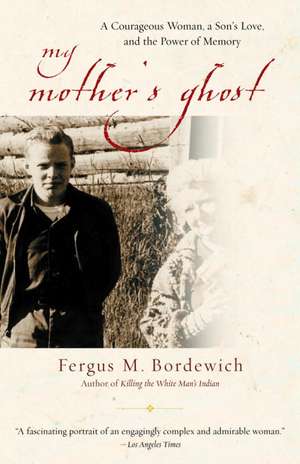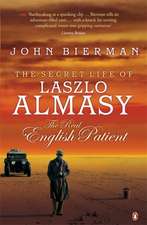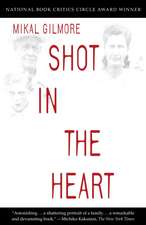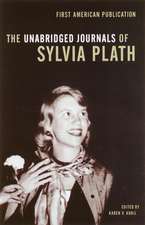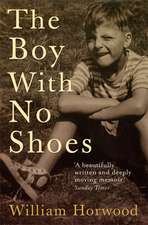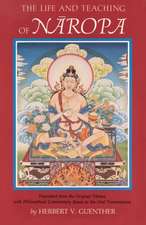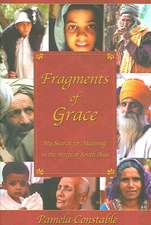My Mother's Ghost: A Courageous Woman, a Son's Love, and the Power of Memory
Autor Fergus M. Bordewichen Limba Engleză Paperback – 31 ian 2002
One morning when Fergus was fourteen, he and his mother went riding, which they did often. It was the last time he saw her alive. Attempting to jump from her runaway horse, LaVerne fell under the hooves of her son’s mount and was killed. Fergus was left with the belief that he was responsible. More than thirty years later and after a lifetime of guilt and self-punishment, the son returned to his mother’s life. My Mother’s Ghost is the story of a brilliant woman cut down in her prime and of a haunted man who confronted the source of his pain, uncovered startling truths, and reclaimed his own life along with that of his mother.
Preț: 105.07 lei
Nou
Puncte Express: 158
Preț estimativ în valută:
20.11€ • 20.87$ • 16.77£
20.11€ • 20.87$ • 16.77£
Carte disponibilă
Livrare economică 01-15 martie
Preluare comenzi: 021 569.72.76
Specificații
ISBN-13: 9780385491303
ISBN-10: 0385491301
Pagini: 336
Dimensiuni: 134 x 201 x 18 mm
Greutate: 0.31 kg
Ediția:0002
Editura: Anchor Books
ISBN-10: 0385491301
Pagini: 336
Dimensiuni: 134 x 201 x 18 mm
Greutate: 0.31 kg
Ediția:0002
Editura: Anchor Books
Notă biografică
Fergus Bordewich is also the author of Killing the White Man’s Indian. He lives in New York’s Hudson Valley.
Extras
We got off to a bad start that summer, the summer of my fourteenth year. Even now, remembering what happened is like watching a continuous film strip that turns back upon itself and is always the same, always curiously comforting in its familiarity, except for its last catastrophic scene, which changed everything.
In 1962 it was a ten-hour drive to the lake from our home in Yonkers, just north of New York City. We had only been on the road a couple of hours when my mother's Buick began to overheat. She let the engine cool off and then started up again and drove for a while before the same thing happened again. Not one to give in easily, least of all to a machine, she toughed it out as long as she could, until we could all see that we weren't going to make it all the way to northern Vermont like that. By the middle of the afternoon she was so snappish that even Maddy, my grandmother, fell silent and the two dogs crouched on the floor of the back seat with their snouts in their paws. Finally she stopped at a repair shop somewhere on Route 22. When the mechanic came out from under the hood, he said it was the thermostat and that he'd have to get a new one from somewhere too far away to put it in that day. When my mother protested, he said that she could go ahead and burn out the engine if she wanted, he didn't care, or we could stay the night in the motel across the road.
Not that I blamed my mother. She hadn't counted on driving all the way herself. As I watched her pacing the concrete apron in front of the garage and lighting Winstons one after the other, sucking hard on them, ignoring the No Smoking signs posted all around, I felt only sympathy. She didn't know how to be helpless and couldn't bear it at all. If I blamed anyone, it was my father, who always drove us to Vermont. He was supposed to join us at the lake in a week. The company he worked for, which had hired him just a few months before and where he planned heating systems for housing developments and plants, had asked him to stay on an extra week. I still couldn't forgive him, even though I knew that he hadn't been free to refuse. I stared furiously over the panorama of hills as green and neat as ones in a kid's storybook, thinking about how we couldn't go riding the next day and worrying that if the car wasn't fixed we'd miss the day after that too, and that maybe we'd never even get to the lake at all, and our whole vacation would be ruined.
That night in the motel I lay with my eyes closed listening to my grandmother's mad voice going on about how she had to get down to Fort Hamilton to roll bandages for the troops. "Which troops?" my mother asked, already knowing the answer, and Maddy said, "Teddy Roosevelt's." My mother answered back with barely suppressed irritation, "That was the Spanish-American War." Then Maddy asked if there was any news in the paper about Mrs. Astor, and then she said that she wanted to go see Nell Hogan as soon as we got back from New Orleans, and my mother said we were going to Vermont not New Orleans and that Nell Hogan was dead and Mrs. Astor was too, and please try to get to sleep now, because we all needed sleep, lots of sleep.
I was not a very observant boy, but I couldn't help seeing that my grandmother was odd. Some days she wore a hairpiece that didn't match her hair, or wore it on the side of her head and insisted that it was a style. She appeared in peculiar combinations of clothing or reported conversations that she said she'd had with one of the dogs. She put strange things on our dinner plates. Sometimes I found her cooking dirt on the stove and saying that she was making stew. Over the past year her memory had become steadily more unpredictable. People and places, entire eras fused and splintered and recombined in ways that increasingly unnerved me.
Next morning, to everyone's relief, the Buick was repaired and ready to go.
My mother rolled the top down and the dogs climbed onto Maddy's lap, and as the car gathered speed their pink tongues flapped like pennants in the wind. The air smelled sweet, and I knew that we'd be crossing the state line into Vermont any time and that now the weeks would unfurl after all into endless days when there would be time enough for everything. We went from farmland to forest and then followed the Green Mountains north until we reached the towns we knew, Hardwick and Glover and Barton, where we always shopped for groceries and bought the New York Times, and where I already felt within the lake's grasp.
The lake lay a few miles east of Barton. It was a dark, ungentle landscape, and it made me uneasy when I was small, before I got to know it and made it my own. The lake--large for the region, nearly seven miles long from end to end--was so deep that on any but the brightest days the deep glacial trough that cradled it swallowed the sunlight entirely, leaving the black surface with a chilly, vestigial glint. The naked cliffs that towered over the lake's southern end and the scree of shattered rock beneath them suggested cataclysm and rupture, a memoir in granite of the primeval violence from which it sprang. Most of the summer cottages, however--usually shingled affairs painted in muted greens and browns and grays--lay in sunnier settings at the northern end of the lake and had cute names like Nod-Away, Wayward Winds, and Brookadoon. And, of course, the Lyndon.
In later years, I vividly "remembered" having spent many seasons in the Lyndon. But this isn't true. In years past we had rented a succession of cottages; my mother had discovered the Lyndon only the year before and been enchanted by its rambling verandas and old yellow planked walls and the huge wood-fired stove that she liked to think of as a dragon that dwelled in the kitchen. I didn't understand then that she craved its space, space into which she could flee from Maddy's nattering drone, space into which she could retreat with her alps of notes from her trips to Alaska and Mississippi and Florida and for the Northern Plains book that was supposed to get written that year.
My mother had had an extraordinary life for a woman of her generation. For most of the last decade she had led the Association on American Indian Affairs, then the only important national organization concerned with the rights of Native Americans. As its executive director, she introduced community activism to Indian country at a time when reservations were governed like colonial satrapies by the Bureau of Indian Affairs and when Washington had committed itself as a matter of policy to the systematic dismantling of the tribes. She charmed even those who opposed her with her vibrant and earthy Irish humor and with an erudition that sometimes daunted even good friends. If she feared anything, it was only boredom and ineffectuality. A stylish dresser, an epitome of Manhattan chic, she nonetheless never seemed more at home than on a busted sofa in some prairie cabin, her arm flung back, and laughing with a Winston dangling jauntily from her lips, surrounded by her Indian friends. Lakotas who adopted her into their family gave her the name Tokeya Icaga Win, or Eldest Child; Omahas called her We-hae-tunga, or Big Sister, and Miccosukees, Knee Hat Kee, or White Day. She never changed her name when she married and was known to everyone she worked with as Miss LaVerne Madigan.
She worked ten and twelve hours a day most days, sometimes six or even seven days a week. When I went to bed, I would often see her scribbling on pad after pad of yellow foolscap, chain-smoking and drinking strong coffee. Sometimes she would still be writing when I woke in the morning, and then she would drink more coffee and then get into the Buick and drive to her office in Manhattan. It was Alaska that was absorbing most of her energy that year. The past November she had brought Inupiat leaders from across the Alaskan Arctic face-to-face with each other for the first time in history, in the town of Barrow, to make them aware that they would soon have to deal with an onrush of legislation intended to forestall future native claims on the new state's land and mineral wealth. She had gone to Alaska again in the spring, and then a third time in June, taking me with her, as she would often do, for two or three weeks at a time, lifting me out of the predictable cycle of suburban life and transforming me, as I imagined, from being just a son, her only child, into a colleague and partner, her best friend.
On this trip she took me to Tanana on the Yukon River, where at her instigation Indians from the lower part of the state were coming together, also for the first time, as the Inupiat had the previous November. Since there were no roads, we flew into Tanana in a small plane over a green tumult of forest so vast and forbidding that as we descended into it I felt as if we were about to sink away in a fathomless green sea. My mother refused any special accommodations for us, and for two days we slept with strangers in someone's home, on floors that were covered with mattresses, sleeping bags, and piles of clothing that did for pillows, and dined on peanut-butter sandwiches and coffee.
The meeting took place in a shingled hall on the edge of the forest. Although much that was said went over my head, I was old enough by now to see how masterful my mother was in the play of debate. She was always at the center of things, yet unobtrusive, never calling attention to herself, always ready to let others take credit for what she had done. And she was afraid of nothing. At fourteen, I was shy and tentative by nature, and her fearlessness amazed me. Mostly, she listened as native people spoke, answering their questions about what she thought Washington meant to do and what kind of help she could give them if they challenged the politicians in Juneau. At one point a Catholic priest stood up, a white man, who said that he was speaking for the villages in his parish. He said he knew that they, his people, not to mention most of the people in that very room, didn't want to get mixed up in politics and that they were sure to suffer for it in the end if they paid attention to outsiders like my mother, who were only filling them with dreams of power that they wouldn't know how to use for many years yet.
I can see them: my mother, a head shorter than anyone else in the place, with her pale Irish skin, her blue eyes clear and penetrating, her pale hair swept back in its vivid natural wave, and then the red-faced priest, scowling down at her, not realizing what he was in for. Standing up, she asked the priest how he had been elected. When he said that he hadn't, but that he didn't need to be because everyone trusted him to speak for them, she asked him, never raising her voice, whether he had ever asked himself whether native people were capable of speaking for themselves. It was obvious that he was unaccustomed to being challenged, because he started to tell her in front of everyone to sit down and be quiet. But she pressed on, gently smiling, telling him that when she was a girl at Sacred Heart School any little boy who spoke to a girl like that would be swatted but good by the nuns. There was silence for a while, maybe even shock at the sight of my mother standing up to the kind of bullying white man they all recognized, and then the Indians began snickering and then laughing as she asked him, didn't he think it was time for native people to make their own decisions and for white people to get out of their way?
As I watched her, I thought fiercely that I wanted to be her more than anything in the world.
We had only been home a week when she flew off again to Washington to testify before a congressional committee on the situation in Alaska, and then to Mississippi to confer with the Choctaws. By the time we left for Vermont, even she admitted that she was ready for a rest.
There was plenty to do at the lake while we waited for my father to arrive. My mother and I went riding every morning on horses that we rented from Wally Hunt, a farmer who lived a little north of the lake on the Barton road. I loved the feel of the animal beneath me and the sense of power that came with it. But far stronger was the knowledge that it was something that belonged to my mother and me alone. It was something we had done together every summer morning in Vermont since Wally had taught me to ride years before. I can now see that I was never much of a rider, never really skilled at anything much more than staying on and avoiding mistakes, and that I mistook obedience and the willingness to follow directions for skill and strength. But I was proud of what I could do then, and I rode with a poise and a self-confidence that I felt almost nowhere else in my life.
In the afternoon we usually swam from the tiny beach below the Lyndon. Later I would sit for hours on the veranda, my chair tilted back against the wall and my feet on the railing, reading Bruce Catton's history of the Army of the Potomac, trying to ignore Maddy's incessant chatter.
One night at dinner Maddy turned to my mother and said, "Wouldn't it be nice if LaVerne was here? That's all we need to be happy!"
My mother looked at her with an expression as close to terror as I ever saw on her face and said, "Mother, I am here."
After my grandmother went to bed, my mother and I sat reading in front of the fire, which we built on chilly evenings and kept stoked with pine logs from a bin on the veranda. I was aware for some time that she was watching me, waiting for me to speak. When I didn't, she told me how we would go together to Nebraska next year and that we'd drive across the sand hills to South Dakota and see the Badlands again, and the Black Hills. And then, smiling at me conspiratorially, she promised that before we left Vermont this year she would teach me to drive, license or no, though I was only fourteen, since plenty of Indian boys began driving when they were even younger than that, so why shouldn't I.
In 1962 it was a ten-hour drive to the lake from our home in Yonkers, just north of New York City. We had only been on the road a couple of hours when my mother's Buick began to overheat. She let the engine cool off and then started up again and drove for a while before the same thing happened again. Not one to give in easily, least of all to a machine, she toughed it out as long as she could, until we could all see that we weren't going to make it all the way to northern Vermont like that. By the middle of the afternoon she was so snappish that even Maddy, my grandmother, fell silent and the two dogs crouched on the floor of the back seat with their snouts in their paws. Finally she stopped at a repair shop somewhere on Route 22. When the mechanic came out from under the hood, he said it was the thermostat and that he'd have to get a new one from somewhere too far away to put it in that day. When my mother protested, he said that she could go ahead and burn out the engine if she wanted, he didn't care, or we could stay the night in the motel across the road.
Not that I blamed my mother. She hadn't counted on driving all the way herself. As I watched her pacing the concrete apron in front of the garage and lighting Winstons one after the other, sucking hard on them, ignoring the No Smoking signs posted all around, I felt only sympathy. She didn't know how to be helpless and couldn't bear it at all. If I blamed anyone, it was my father, who always drove us to Vermont. He was supposed to join us at the lake in a week. The company he worked for, which had hired him just a few months before and where he planned heating systems for housing developments and plants, had asked him to stay on an extra week. I still couldn't forgive him, even though I knew that he hadn't been free to refuse. I stared furiously over the panorama of hills as green and neat as ones in a kid's storybook, thinking about how we couldn't go riding the next day and worrying that if the car wasn't fixed we'd miss the day after that too, and that maybe we'd never even get to the lake at all, and our whole vacation would be ruined.
That night in the motel I lay with my eyes closed listening to my grandmother's mad voice going on about how she had to get down to Fort Hamilton to roll bandages for the troops. "Which troops?" my mother asked, already knowing the answer, and Maddy said, "Teddy Roosevelt's." My mother answered back with barely suppressed irritation, "That was the Spanish-American War." Then Maddy asked if there was any news in the paper about Mrs. Astor, and then she said that she wanted to go see Nell Hogan as soon as we got back from New Orleans, and my mother said we were going to Vermont not New Orleans and that Nell Hogan was dead and Mrs. Astor was too, and please try to get to sleep now, because we all needed sleep, lots of sleep.
I was not a very observant boy, but I couldn't help seeing that my grandmother was odd. Some days she wore a hairpiece that didn't match her hair, or wore it on the side of her head and insisted that it was a style. She appeared in peculiar combinations of clothing or reported conversations that she said she'd had with one of the dogs. She put strange things on our dinner plates. Sometimes I found her cooking dirt on the stove and saying that she was making stew. Over the past year her memory had become steadily more unpredictable. People and places, entire eras fused and splintered and recombined in ways that increasingly unnerved me.
Next morning, to everyone's relief, the Buick was repaired and ready to go.
My mother rolled the top down and the dogs climbed onto Maddy's lap, and as the car gathered speed their pink tongues flapped like pennants in the wind. The air smelled sweet, and I knew that we'd be crossing the state line into Vermont any time and that now the weeks would unfurl after all into endless days when there would be time enough for everything. We went from farmland to forest and then followed the Green Mountains north until we reached the towns we knew, Hardwick and Glover and Barton, where we always shopped for groceries and bought the New York Times, and where I already felt within the lake's grasp.
The lake lay a few miles east of Barton. It was a dark, ungentle landscape, and it made me uneasy when I was small, before I got to know it and made it my own. The lake--large for the region, nearly seven miles long from end to end--was so deep that on any but the brightest days the deep glacial trough that cradled it swallowed the sunlight entirely, leaving the black surface with a chilly, vestigial glint. The naked cliffs that towered over the lake's southern end and the scree of shattered rock beneath them suggested cataclysm and rupture, a memoir in granite of the primeval violence from which it sprang. Most of the summer cottages, however--usually shingled affairs painted in muted greens and browns and grays--lay in sunnier settings at the northern end of the lake and had cute names like Nod-Away, Wayward Winds, and Brookadoon. And, of course, the Lyndon.
In later years, I vividly "remembered" having spent many seasons in the Lyndon. But this isn't true. In years past we had rented a succession of cottages; my mother had discovered the Lyndon only the year before and been enchanted by its rambling verandas and old yellow planked walls and the huge wood-fired stove that she liked to think of as a dragon that dwelled in the kitchen. I didn't understand then that she craved its space, space into which she could flee from Maddy's nattering drone, space into which she could retreat with her alps of notes from her trips to Alaska and Mississippi and Florida and for the Northern Plains book that was supposed to get written that year.
My mother had had an extraordinary life for a woman of her generation. For most of the last decade she had led the Association on American Indian Affairs, then the only important national organization concerned with the rights of Native Americans. As its executive director, she introduced community activism to Indian country at a time when reservations were governed like colonial satrapies by the Bureau of Indian Affairs and when Washington had committed itself as a matter of policy to the systematic dismantling of the tribes. She charmed even those who opposed her with her vibrant and earthy Irish humor and with an erudition that sometimes daunted even good friends. If she feared anything, it was only boredom and ineffectuality. A stylish dresser, an epitome of Manhattan chic, she nonetheless never seemed more at home than on a busted sofa in some prairie cabin, her arm flung back, and laughing with a Winston dangling jauntily from her lips, surrounded by her Indian friends. Lakotas who adopted her into their family gave her the name Tokeya Icaga Win, or Eldest Child; Omahas called her We-hae-tunga, or Big Sister, and Miccosukees, Knee Hat Kee, or White Day. She never changed her name when she married and was known to everyone she worked with as Miss LaVerne Madigan.
She worked ten and twelve hours a day most days, sometimes six or even seven days a week. When I went to bed, I would often see her scribbling on pad after pad of yellow foolscap, chain-smoking and drinking strong coffee. Sometimes she would still be writing when I woke in the morning, and then she would drink more coffee and then get into the Buick and drive to her office in Manhattan. It was Alaska that was absorbing most of her energy that year. The past November she had brought Inupiat leaders from across the Alaskan Arctic face-to-face with each other for the first time in history, in the town of Barrow, to make them aware that they would soon have to deal with an onrush of legislation intended to forestall future native claims on the new state's land and mineral wealth. She had gone to Alaska again in the spring, and then a third time in June, taking me with her, as she would often do, for two or three weeks at a time, lifting me out of the predictable cycle of suburban life and transforming me, as I imagined, from being just a son, her only child, into a colleague and partner, her best friend.
On this trip she took me to Tanana on the Yukon River, where at her instigation Indians from the lower part of the state were coming together, also for the first time, as the Inupiat had the previous November. Since there were no roads, we flew into Tanana in a small plane over a green tumult of forest so vast and forbidding that as we descended into it I felt as if we were about to sink away in a fathomless green sea. My mother refused any special accommodations for us, and for two days we slept with strangers in someone's home, on floors that were covered with mattresses, sleeping bags, and piles of clothing that did for pillows, and dined on peanut-butter sandwiches and coffee.
The meeting took place in a shingled hall on the edge of the forest. Although much that was said went over my head, I was old enough by now to see how masterful my mother was in the play of debate. She was always at the center of things, yet unobtrusive, never calling attention to herself, always ready to let others take credit for what she had done. And she was afraid of nothing. At fourteen, I was shy and tentative by nature, and her fearlessness amazed me. Mostly, she listened as native people spoke, answering their questions about what she thought Washington meant to do and what kind of help she could give them if they challenged the politicians in Juneau. At one point a Catholic priest stood up, a white man, who said that he was speaking for the villages in his parish. He said he knew that they, his people, not to mention most of the people in that very room, didn't want to get mixed up in politics and that they were sure to suffer for it in the end if they paid attention to outsiders like my mother, who were only filling them with dreams of power that they wouldn't know how to use for many years yet.
I can see them: my mother, a head shorter than anyone else in the place, with her pale Irish skin, her blue eyes clear and penetrating, her pale hair swept back in its vivid natural wave, and then the red-faced priest, scowling down at her, not realizing what he was in for. Standing up, she asked the priest how he had been elected. When he said that he hadn't, but that he didn't need to be because everyone trusted him to speak for them, she asked him, never raising her voice, whether he had ever asked himself whether native people were capable of speaking for themselves. It was obvious that he was unaccustomed to being challenged, because he started to tell her in front of everyone to sit down and be quiet. But she pressed on, gently smiling, telling him that when she was a girl at Sacred Heart School any little boy who spoke to a girl like that would be swatted but good by the nuns. There was silence for a while, maybe even shock at the sight of my mother standing up to the kind of bullying white man they all recognized, and then the Indians began snickering and then laughing as she asked him, didn't he think it was time for native people to make their own decisions and for white people to get out of their way?
As I watched her, I thought fiercely that I wanted to be her more than anything in the world.
We had only been home a week when she flew off again to Washington to testify before a congressional committee on the situation in Alaska, and then to Mississippi to confer with the Choctaws. By the time we left for Vermont, even she admitted that she was ready for a rest.
There was plenty to do at the lake while we waited for my father to arrive. My mother and I went riding every morning on horses that we rented from Wally Hunt, a farmer who lived a little north of the lake on the Barton road. I loved the feel of the animal beneath me and the sense of power that came with it. But far stronger was the knowledge that it was something that belonged to my mother and me alone. It was something we had done together every summer morning in Vermont since Wally had taught me to ride years before. I can now see that I was never much of a rider, never really skilled at anything much more than staying on and avoiding mistakes, and that I mistook obedience and the willingness to follow directions for skill and strength. But I was proud of what I could do then, and I rode with a poise and a self-confidence that I felt almost nowhere else in my life.
In the afternoon we usually swam from the tiny beach below the Lyndon. Later I would sit for hours on the veranda, my chair tilted back against the wall and my feet on the railing, reading Bruce Catton's history of the Army of the Potomac, trying to ignore Maddy's incessant chatter.
One night at dinner Maddy turned to my mother and said, "Wouldn't it be nice if LaVerne was here? That's all we need to be happy!"
My mother looked at her with an expression as close to terror as I ever saw on her face and said, "Mother, I am here."
After my grandmother went to bed, my mother and I sat reading in front of the fire, which we built on chilly evenings and kept stoked with pine logs from a bin on the veranda. I was aware for some time that she was watching me, waiting for me to speak. When I didn't, she told me how we would go together to Nebraska next year and that we'd drive across the sand hills to South Dakota and see the Badlands again, and the Black Hills. And then, smiling at me conspiratorially, she promised that before we left Vermont this year she would teach me to drive, license or no, though I was only fourteen, since plenty of Indian boys began driving when they were even younger than that, so why shouldn't I.
Recenzii
“Beautifully written…. A fascinating portrait of an engagingly complex and admirable woman.”–Los Angeles Times
“Vivid. . . . A moving account of Bordewich’s quest to come to terms with his mother’s death. . . . A poignant tribute to a remarkable woman.” --Bookpage
“A moving account of love, guilt, death, and finally, and exoneration with consequences. An important book.” --James Welch, author of Heartsong of Charging Elk
“This is so straightforward, without pretension, so full of quiet intelligence and discernment–compassion too.” John Bayley, author of Elegy for Iris
